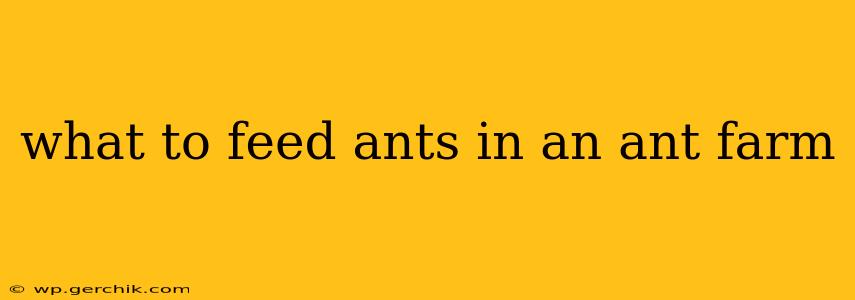What to Feed Ants in an Ant Farm: A Comprehensive Guide
Keeping an ant farm is a fascinating way to observe the intricate social structures and industrious behavior of these tiny creatures. However, providing the right nutrition is crucial for their health and longevity. This guide explores the best foods for your ant colony, addressing common questions and concerns.
What are the best foods for ants in an ant farm?
The ideal ant farm diet consists of a varied selection of foods that mimic their natural foraging habits. Avoid sugary treats, as these can lead to health problems and fungal growth within the farm. Instead, opt for these:
- Insects: Small insects like fruit flies (Drosophila melanogaster) are excellent protein sources. You can purchase cultures of fruit flies online or at pet stores. Just be sure to introduce them into the ant farm sparingly to avoid overwhelming your colony.
- Seeds: Tiny seeds like millet, quinoa, or niger seeds provide carbohydrates and essential nutrients. Scatter a small amount in the farm, and remove any uneaten seeds after a few days to prevent mold.
- Honey: A tiny drop of honey (or a diluted honey-water solution) offers a quick energy boost, but use it sparingly. Too much honey can be detrimental.
- Sugary Water: A very dilute solution of sugar and water can supplement the diet, but only in small amounts. Overuse can lead to the same issues as excessive honey.
- Fruits and Vegetables: Small pieces of soft fruits (like apple slices, banana, or melon) or vegetables (such as finely grated carrots) can be offered occasionally. Remove any uneaten portions promptly.
What NOT to feed ants in an ant farm?
Certain foods should be strictly avoided, as they can harm your ants or contaminate their environment:
- Processed foods: These lack nutritional value and can lead to health issues.
- Sugary snacks (candy, chocolate, etc.): As mentioned before, these can cause fungal growth and other problems.
- Salty foods: High salt content is detrimental to ant health.
- Dairy products: Ants cannot digest dairy.
- Meat: While ants in the wild may consume meat occasionally, it's not ideal for an ant farm environment.
What kind of food do ants like?
Ants have diverse dietary preferences depending on the species. However, most ant species appreciate a balanced diet encompassing proteins (insects), carbohydrates (seeds and honey), and small amounts of sugars. Observing your ants will help you determine their favorites. If they readily consume one food source over another, it is a sign of preference.
How often should I feed ants in an ant farm?
Feeding frequency depends on your colony size and the type of food. Start with feeding small amounts every few days. Monitor the food consumption and adjust accordingly. Remove any uneaten food promptly to prevent mold growth. Overfeeding is a bigger problem than underfeeding.
What happens if I overfeed my ants?
Overfeeding can lead to several problems:
- Mold and mildew: Uneaten food will quickly mold and can contaminate the entire ant farm.
- Health problems: Excess sugar and improper diet can make the ants sick.
- Waste buildup: Excess waste can contaminate the habitat.
Can I give my ants sugar water?
Yes, a very diluted sugar water solution can occasionally be used as a supplemental food source. However, overuse can lead to the problems mentioned above. It's always best to favor a more balanced diet of insects and seeds.
My ants are not eating, what should I do?
If your ants are refusing food, consider the following:
- Species-specific diet: Some ants have unique dietary needs. Research your ant species for specific requirements.
- Environmental factors: Stressful conditions like temperature changes or insufficient humidity can impact feeding habits.
- Colony health: Illness within the colony can cause loss of appetite.
If you continue to have problems, consult resources specific to your ant species or seek advice from ant-keeping communities online. Remember, observation is key to understanding your ant colony's needs and preferences. Enjoy watching your industrious colony thrive!
